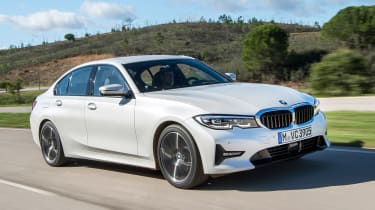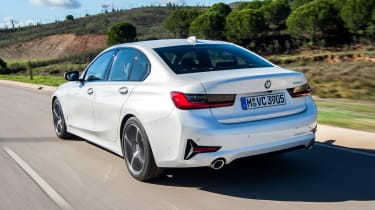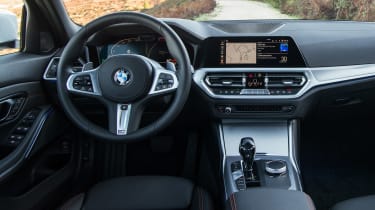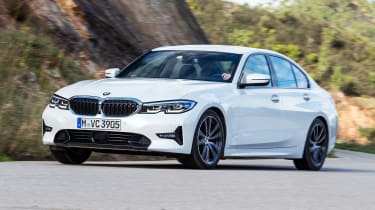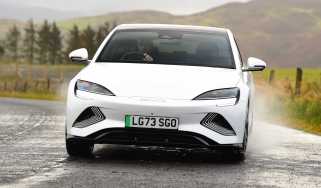New BMW 3 Series 2019 review
Does the new seventh-generation BMW 3 Series compact executive saloon go straight to the top of the class? We reveal all…

BMW has improved the 3 Series in every area. It’s more comfortable, practical, refined and technologically advanced than it has ever been. Of course, you will pay more for it, too, but the price increase is reasonable. The real key here is how well all these new systems – both mechanical and electronic – have been integrated to make it so easy to live with. And perhaps most importantly of all for a BMW, the 3 Series is still brilliant to drive.
For 43 years, the BMW 3 Series has defined a sector. Think compact executive saloon and, chances are, the model that will spring to the forefront of your mind is this one. Over the past seven iterations, the 3 Series stands as BMW’s best-selling product.
So how do you remaster an icon for the modern era? BMW has form here, but it’s still set itself an enormous task for the G20-generation 3 Series. And with improvements in chassis and engine tech, infotainment, packaging and efficiency – and many more innovations besides – the brand has once again succeeded in delivering a brilliant junior exec and, potentially, a hammer blow to its rivals.
Used - available now

2020 BMW
3 Series
36,603 milesAutomaticDiesel2.0L
Cash £23,100
2022 BMW
3 Series
53,629 milesAutomaticPetrol2.0L
Cash £17,700
2022 BMW
3 Series
80,790 milesAutomaticPetrol2.0L
Cash £15,000
2020 BMW
3 Series
44,032 milesAutomaticDiesel2.0L
Cash £20,800Thanks to BMW’s CLAR architecture – new for the 3 Series – the latest model is up to 55kg lighter than its predecessor. It’s not often a car sheds weight despite growing in size and gaining more kit. Body rigidity has improved by as much as 50 per cent, too. There’s also the 3 Series’ 50:50 weight distribution, and all these elements have helped to improve the car’s dynamic ability.
Innovation comes in the form of BMW’s standard stroke-dependent suspension damper technology as well. This basically means when the car is empty and not loaded with people or luggage, the damping rate is softer, giving a mostly fluid and compliant sense to the ride quality.
When you’ve got a full complement of passengers and their luggage on board, the damping reacts to the extra weight and offers extra control – but this tauter setting doesn’t necessarily degrade ride quality too much. We’d maybe like a little more compliance, but the 3 Series’ chassis still has a supple edge; it merely governs the additional mass more rigidly.
On our Sport model’s larger 18-inch wheels the ride occasionally felt unsettled, but its rivals aren’t immune to this trait, either. The BMW still filtered out the worst the Portuguese roads of our test route threw at the chassis, while the trade-off for this is an exploitable level of dynamic ability.
The 3 Series’ agility is great. Just as the suspension controls the car’s masses to deliver comfort, it does so equally well to provide sweet, swift changes of direction. There’s plenty of grip, helped by a wider track front and rear, and not too much roll.
However, the steering is possibly a little too light in the Comfort driving mode, and feels artificially weighted if you step it up to Sport. As with nearly all electrically assisted set-ups, it also doesn’t deliver much in the way of feedback, but at least the rack is a good speed and pointy, so you can place the car accurately. Combined with the grip, it’s this facet of the car’s personality that gives you the confidence to exploit the chassis’ balance. As with most BMWs, this is genuinely rewarding.
• New BMW M340i xDrive prototype review
Meanwhile, the engine is a known quantity: BMW’s 2.0-litre four-cylinder turbodiesel with 187bhp and 400Nm of torque in this 320d. There’s still a diesel rattle when you extend the motor, but it’s better suppressed than before, so refinement is good.
The broad spread of torque means performance is adequate, if not rapid. The 0-62mph sprint takes 6.8 seconds with the eight-speed automatic gearbox, which goes about its business faultlessly.
Take manual control using the paddles and the changes are just as quick, but leaving the box in ‘D’ most of the time makes it a more relaxing experience because the calibration of the system is excellent. It’s not too eager to kick down when overtaking on the motorway, while the flexibility the engine and transmission package gives you is broad enough.
Efficiency is strong, too. BMW claims 65.7mpg and CO2 emissions of 112g/km for this 320d auto in Sport trim, so running costs should be competitive.
The good news continues inside, because the new platform’s 41mm-longer wheelbase means more legroom in the back. The rear feels spacious enough for a car in this sector and roomier than a Jaguar XE. Although the boot is unchanged, at 480 litres, the old 3 was among the class leaders here anyway.
Up front the latest model feels just as accommodating, with a noticeable step up in quality (it feels almost like a mini 5 Series) and a new dash that slickly integrates the tech. There have been some big advances in that department, too. iDrive infotainment was already one of the best interfaces on the market, but the new car’s 7.0 operating system advances things yet another step.
Optional BMW Live Cockpit Professional gets a 12.3-inch digital dash panel and a 10.25-inch central screen; the latter is controlled either by touch or the familiar rotary wheel on the centre console. It’s enhanced by BMW’s Intelligent Personal Assistant, a voice-controlled set-up that responds to natural voice commands, giving you the ability to adjust the temperature, set the nav or change the radio station, track or volume as you would by asking Amazon Alexa or Siri. Apple CarPlay is also standard, but there’s no Android Auto for now at least.
This tech extends to over-the-air software updates, which will keep your OS as fresh as possible, and an optional digital key that uses your smartphone to open the doors.
The list of standard kit is extensive, with satellite navigation, adaptive LED lights, heated leather seats, front and rear parking sensors with a reversing camera, 18-inch alloys and cruise control all featuring.
Prices have risen by nearly a couple of thousand pounds, with this 320d automatic in Sport trim coming in at £36,700. However, given the extra standard equipment and more advanced options, plus the greater refinement, extra space and more tech than ever, the 3 Series looks like it could reset the junior exec saloon sector benchmark when it hits the UK.

